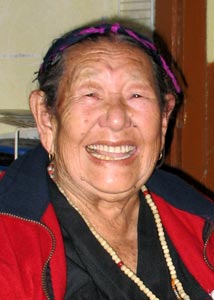Name: Yeshi Lhadon
(Alias: No)
Gender: Female
Interview Age: 86
Date of Birth: 1921
Birthplace: Doktsa, Kham, Tibet
Year Left Tibet: 1959
Profession: Agriculture, Dairy Farming
Monk/Nun: No
Political Prisoner: No

Interview No.: 12
Date: 2007-06-29
Language: Tibetan
Location: Lugsung Samdupling Settlement, Bylakuppe, Karnataka, India
Categories: Chinese Invasion and Occupation
Keywords: childhood memories, Chinese -- first appearance of, Chinese -- oppression under, Dalai Lama, escape experiences, farm life, forced labor, houses/villages, Kham, nomadic life, trade
Summary:
Yeshi Lhadon believes her village, Doktsa, was the happiest place--with high mountains, temples on the mountains and villages down below. There were no schools or hospitals, but the villagers were completely self-reliant. She was about 14 years old when both her parents died and she became responsible for raising her two younger sisters. She was never able to enjoy her childhood days like a normal child. When the Chinese arrived in her village, they gave the villagers tools and told them they must work harder to cultivate the land.
Yeshi Lhadon and her husband left their village to go to Lhasa because rumors were spreading that the Chinese would mistreat everyone and take away the children. They worked as laborers for the Chinese doing bridge construction near the city. Then they moved to Phari near the Indian border and stayed there for 5 years while contemplating escape to India, which they finally attempted in 1959 when Yeshi Lhadon was 37 years old.
Interview Team:
- Marcella Adamski (Interviewer)
- Tenzin Yangchen (Interpreter)
- Jeff Lodas (Videographer)

